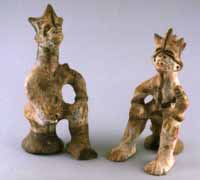 |
ARE THE IGBO? |
 |
 |
ARE THE IGBO? |
 |
If you were of age during the Vietnam War era, you might remember being shocked by television pictures of starving African children, their bellies swollen, their bodies emaciated, and their eyes staring vacantly. For many Americans this would have been their first introduction to the Igbo people of southeastern Nigeria.The British colonial masters finally withdrew from Nigerian territory in 1960, after arbitrarily imposing national boundaries that pushed together three large and numerous smaller ethnic groups, each with its own ancient customs, traditions, languages and clannish loyalties. The ordinary citizens were not asked for their approval of these arrangements--they were simply told about them.
There followed an outmigration of Igbo from the crowded southeast into the more sparsely populated Muslim north. Generally, the Igbo had embraced western education while the northerners (Hausa-Fulani) had resisted it. The northerners viewed with distaste this perceived invasion by their industrious southern countrymen. Thus, with a series of ineffectual leaders rushing to grab power at the center, and an overly aggressive military eager to step in, the political situation exploded with a military coup in the late 60's. A horrible massacre of Igbo people then took place in the north. Those who survived fled south to the homeland, where a secessionist movement, known as the Biafran War (1967-70), arose under the leadership of Odumegwu Ojukwu. The federal government crushed the movement in two and a half years, using starvation as a "legitimate weapon of war."
The demoralizing postwar conditions in Igboland provided the push toward a global diaspora that continues to this day. The Igbo can now be found in their hundreds of thousands in all parts of the world.
It would seem that the indomitable Igbo spirit has persevered in many areas of life, but has lagged behind in recognizing the importance of studying, preserving and standardizing their language. I hope that my efforts on these pages may stimulate more activity toward these goals.
Frances W. Pritchett
Little Rock, Arkansas
January 2003